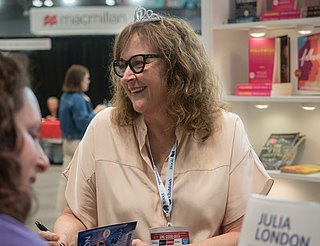A Quote by Ann Brashares
Besides being asked why I write about young characters, I am often asked how I write about young characters. How do I throw myself across the chasm of full adulthood to relive that period? I guess I don’t, really. Age is not so much a feature of your character, as the spot where you stand for a pretty fleeting time on the arc of your life.
Related Quotes
I find that I am much slower in the beginning of a book. I am thinking of the plot, of the characters and who they are, and where they are going. I often throw out a lot of the writing I start with, because the characters and plot improve as I write. Or perhaps I should say it is my hope they will improve as I write.
I don't write about love because it makes for easy, passive heroes. I write about how love makes my characters more autonomous, more self-possessed, more opinionated and powerful. I write about characters who pursue relationships that make them the people they want to become. I write about love as a superpower.
When Abba Anthony thought about the depths of the judgments of God, he asked, 'Lord, how is it that some die when they are young, while others drag on to extreme old age? Why are there those who are poor and those who are rich? Why do wicked men prosper and why are the just in need?' He heard a voice answering him, 'Antony, keep your attention on yourself; these things are according to the judgment of God, and it is not to your advantage to know anything about them.'
Once, during an interview in front of my wife, I was asked, "Are you one of those actors who brings your character home? Do you stay in character?" I said, "No, not really. I don't do that," and she started laughing. I asked her why. She said, "Well, you might think you don't bring characters home, but you do." So, while I don't feel like a character is lingering, it probably is.
I often feel like that with the way I portray myself I come off as looking much worse than any of the other characters. I guess it might also be worth noting that anyone I've had as a main character in a story I've written has had full knowledge that I am a writer who writes about the people in her life.
The first act of insight is throw away the labels. In fiction, while we do not necessarily write about ourselves, we write out of ourselves, using ourselves; what we learn from, what we are sensitive to, what we feel strongly about--these become our characters and go to make our plots. Characters in fiction are conceived from within, and they have, accordingly, their own interior life; they are individuals every time.
I think that I write much more naturally about characters in solitude than characters interacting with others. My natural inclination - and one that I've learned to push against - is to give primacy to a character's interior world. Over the three books that I've written, I've had to teach myself that not every feeling needs to be described and that often the most impactful writing more elegantly evokes those unnamed feelings through the way characters speak and behave.
It was quite frightening to be asked to write the music of a Western because there are so many things that you can refer to that can be cliche, and that could really poison your mind, from Morricone, to Bernstein, to Neil Young. So much music has been written for Westerns, that you wonder how you're going to find a new or different idea.
I think writing about the time in Hermione’s life that I write about – growing from childhood into womanhood, literally, I think it? brought back to me how very difficult it is.So much is expected of you as you become a woman, and often you are asked to sacrifice parts of you in becoming a girl, I would say. Hermione doesn’t.






































